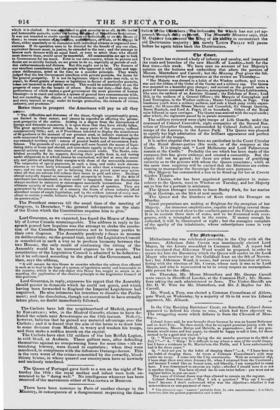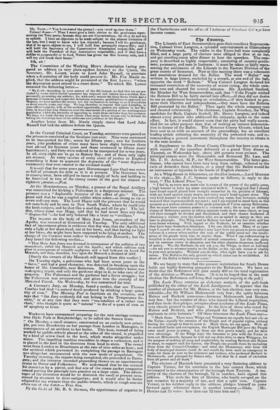In the City Revising Barristers' Court, on Saturday, Colonel Jones
appeared to defend his claim to vote, which hud been objected to. The swaggering scene which follows is from the Chronicle of Mon- day— Colonel Jones said, he was brought there because he was an honest Reformer and an Anti.Tory. He then stated, that he occupied premises jointly with his two partners, Messrs. Buttye and Melville, as papermakers ; and if any gen- tleman would come and buy paper, he should be happy to sell it him, for there seemed to be a good deal wasted." Q. " Where have you slept during the six months previous to the 20th of July ?"—" A. " Sleep ! It is difficult to say where a man of the world sleeps; but 1 have a residence in St. Martin's.in.the. Fields, and I have unfortunately had it for three years." Q. " And are you in the habit of sleeping there? "—A. " I have been in the habit of sleeping these. At times a Common Councilman's wife may entice me away. I come into the City occasionally. With an occasional slip, I have slept there ever since January 31, when 1 returned from the Continent ; and because'l voted like an honest man, and liberally, I am compelled to come here. I was determined to exercise my right—whether I should have it or not is another thing. You have allowed me to vote twice before: you were not so vigilant before as you are now." The name of Colonel Jones was then allowed to remain on the register. Colonel Jones then said—" May I ask a question ? Why am I brought here ? because I don't understand what was the objection—whether it was non-residence or non-payment of rates."
• The Chroaele says •• wasted," probably from its own consciousness : it is likely, however, that the gallant papermaker said wanted. Mr. Trott—"You have mated the ground—you roved against teem." Colonel Jones—" Then I most give a little advice to the gentlemen repro• seating the .Tory party, heeause they are not Conservatives, for the y do not try to uphold. I have no objection to be made subject to the utmost visitation of the law, but I wept to know who ban objected; because I tell the gentleman, that if he again objects to me, I will hold him personally respora ; and I will hold the Secretary of the Conservative Association respoodble, and I will hold the President of that Association responsible; and if they have a dislike to gunpowder or to lead, Nature has given me this brawny arm, and I will try and break their bones."
Oh, oh !
The Committee of the Working Men's Association laving pre- pared an address (a very plain-spoken lecture) to the Queen, the Secretary, Mr. Lovett, wrote to Lord John Russell, to ascertain when a deputation of the body could present it. Mr. Fox Maule re- plied, that the address might be presented at the first Levee; "when the deputation must attend in a court dress." To which Mr. Lovett returned the following letter-
.' My Lord—Accordiug to your answer of the 6th Instant, we find that we are pre- eluded If) forms which Gothic ignorance has Imposed and custom has !preened. from personally presenting our address; for, with every respect for those forms which smile personal cleanliness and respectful behaviour necessary qualifications to approach her Majesty, we have neither the means nor the inclination to indulge in alit h absurdities as dress swords, coats, and wigs. We beg, therefore, to request that your Lordship, in your official capacity, will, at the earliest opportunity, present our address to her Ma- jesty, in hopes she may chance to read the sentiments of a portion of her working-class population, w Welt the necessity of appearing iu court dress excludes from her presence. We hope, env Lord, the day is not distant when some better means will Le devised for letting the Sovereign hear of the addresses and petitions of the People."
Another letter from Mr. Allude simply states that Lord John Russell had laid the address before the Queen.



























 Previous page
Previous page